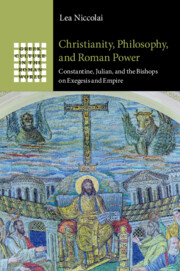 Christianity, Philosophy, and Roman Power
Christianity, Philosophy, and Roman Power from Part III - After Julian: Philosophy in the World
Published online by Cambridge University Press: 07 July 2023
Chapter 6 investigates the debate surrounding Julian’s final – and fundamental, in the eyes of late Roman intellectuals – objection to Christianity: his critique of its universalising rhetoric. Third- and fourth-century bishops legitimised their increasing political prominence through competitive arguments pointing to Christianity as the only philosophy that was accessible to everyone, including the ill-educated. Julian set in opposition to this the Platonist belief that any self-confessed system of knowledge appealing to the many disqualifies its intellectual authority by revealing crowd-pleasing (hence, deceptive) ambitions. The reaction of upper-class Christians, divided between the popular consensus and allegiance to Julian’s elitist sensibilities, demonstrates the criticality of this argument. Yet – as I show in the second section – the Neoplatonic objection to the Christian rhetoric of universalism ultimately displaced non-Christian philosophers from the political scene (Eunapius’ Lives of the Philosophers and Sophists). Moreover, the rising popularity of ascetic leaders encouraged even highly authoritative ecclesiastical voices (e.g., John Chrysostom) to question the validity of Greco-Roman education. This, ironically, resulted in a power-driven challenge to the validity of the cultural system whose adaptation had been key to stabilising Christian power.
To save this book to your Kindle, first ensure no-reply@cambridge.org is added to your Approved Personal Document E-mail List under your Personal Document Settings on the Manage Your Content and Devices page of your Amazon account. Then enter the ‘name’ part of your Kindle email address below. Find out more about saving to your Kindle.
Note you can select to save to either the @free.kindle.com or @kindle.com variations. ‘@free.kindle.com’ emails are free but can only be saved to your device when it is connected to wi-fi. ‘@kindle.com’ emails can be delivered even when you are not connected to wi-fi, but note that service fees apply.
Find out more about the Kindle Personal Document Service.
To save content items to your account, please confirm that you agree to abide by our usage policies. If this is the first time you use this feature, you will be asked to authorise Cambridge Core to connect with your account. Find out more about saving content to Dropbox.
To save content items to your account, please confirm that you agree to abide by our usage policies. If this is the first time you use this feature, you will be asked to authorise Cambridge Core to connect with your account. Find out more about saving content to Google Drive.